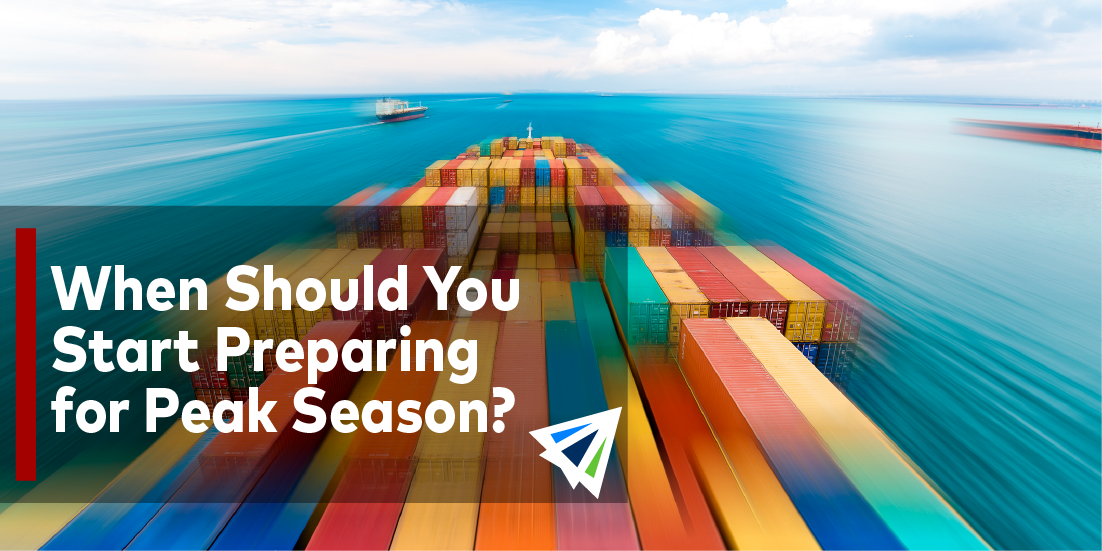If 2020 has taught us all anything, it’s that preparation is essential in all facets of business – especially logistics. While the first half of the year was slow, the back half was intense and only those who were incredibly prepared saw minimal interruption in their logistics processes.
And while a global pandemic has certainly taught us all to prepare in our shipping process, every year we need to be vigilant of preparation due to peak season.
When to Prepare for Peak Season
Peak season in shipping generally refers to January/February when Chinese New Year comes around, however, there is also a major peak season between August-October when businesses around the world rush to secure space and get their products shipped before the upcoming holidays.
The thing about peak seasons is that it’s drastically more difficult to secure space aboard a vessel, get a hold of containers, and move your cargo with the same ease and efficiency as you usually do. Due to high demand and short supply, all shippers are competing for space aboard ocean vessels and if you’re not properly prepared, the whole process can be a nightmare.
Here are things to keep in mind as you prepare for peak season shipping!
Give Yourself Lead Time
You should prepare for peak season twice as long in advance if it’s possible. Give yourself several months’ time to think through what your product availability needs to look like and begin planning the shipment much sooner than your usual ones. You’ll thank yourself later when other shippers are scrambling to find space and dodge ridiculously high rates.
Also, giving yourself plenty of lead time on your shipments during peak season will keep you from the risk of rolled cargo. During peak seasons, cargo vessels are frequently overbooked and shippers’ cargo gets rolled all the time. Plan ahead to mitigate the risk of it ever happening to your company!
Prioritize Your Shipments
If you have several shipments – some more time sensitive than others – it’s time to make sure that your shipping schedules are planned accordingly. As stated, as you get closer to peak seasons the chances of rolled cargo and missing vessel availability drastically increases.
Figure out which of your shipments are most time sensitive or have harsh deadlines. Figure out a process with your freight forwarder to ensure that those products have proper warehousing setup at destination (if needed), and get those products there before the traffic jam of peak season hits!
Split Shipments to Multiple BOL’s
Remember that your “shipment” does not refer to a container. A shipment is defined per the BOL that you are using, so if a carrier decides to roll your shipment and you have 5 shipping containers under a single Bill Of Lading, you may be SOL (Ship Out of Luck, that is…)
Talk with your freight forwarder about how to split up your shipments between various different BOL’s to mitigate the risk of cargo being rejected, held, or rolled during the shipping process.
Depending on the nature of your product, potential deadlines that need to be met, and the need for further mitigating risk, you might even consider splitting the shipment up to put several boxes with an air carrier and the rest with an ocean carrier. This type of diversification further reduces the risk of something going wrong when all your eggs are in one basket so to speak.
Buy Cargo Insurance
Seriously… We’ve said this so many times before. Regardless of what you think you’ve been told about your cargo being insured by the ocean carrier – it’s not. According to COGSA law, a carrier is only required to pay a maximum of $500 per “shipping unit” (which they define as a container). So if anything goes wrong during the peak season scramble as your cargo is franticly loaded aboard a vessel, you may be entitled to a maximum compensation of $500 for all of your damaged or lost cargo.
Cargo insurance is incredibly affordable and it is easy to get a hold of. Talk with a freight forwarder like Interlog USA to figure out how you can insure your cargo to mitigate the risks associated with the carrier scramble during peak shipping season.
Use an Experienced Freight Forwarder
Experienced freight forwarders are required to deal with thousands of shipments through peak seasons and to get customers’ cargo to destination without any hiccups in the process. Those who have worked in the industry for a long time with trusted reputation can help educate you on what to do to avoid issues during peak shipping seasons.
Interlog USA specifically is the only freight forwarder to have actively solved the 4 Great Burns of the Transportation Industry through our SHIELD Protocol. All the typical frustrations of peak season shipments can be boiled down into one of four categories, and we have actively worked with hundreds of shippers to design a protocol that is proven to work – not by lofty marketing language but through actual data and proven processes.
If you’re interested in planning ahead for peak season and figuring out what your company can start doing to gear up for the next peak season rush, don’t hesitate to reach out and talk to one of our team members! We would love to help you and your team with any questions you may have!
